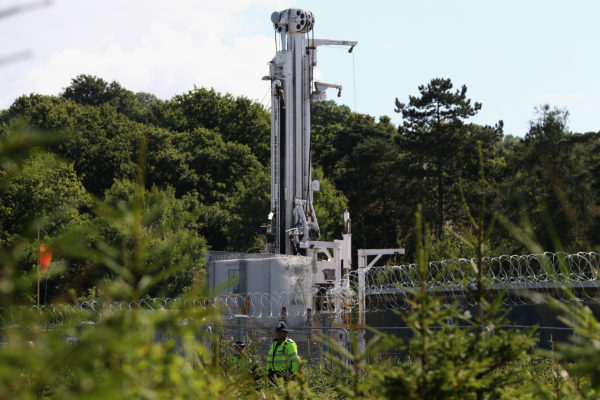Declassified government report describes shocking impacts of fracking on local communities
After a nearly year-long legal battle over the report's release, the Department for Environment, Food and Rural Affairs was ordered to publish by the UK's transparency watchdog

People that live near fracking sites could suffer health problems and financial hardships caused by the emerging industry, according to a newly declassified government report.
The draft document – which was partially released last year following an Unearthed freedom of information request – includes striking passages that were previously blacked out, including the most dramatic claim that:
“Properties located within a 1 – 5 mile radius of the fracking operation may also incur an additional cost of insurance to cover losses in case of explosion on the site.”
“Such an event,” the author notes, “would clearly have social impacts.”
The report, the full release of which was ordered last month by the Information Commissioner after a nearly year-long legal battle, also details several other possible health and financial impacts.
And on climate change, it says that fracking in the UK could cause a gross increase in global CO2 emissions — if the gas that would otherwise be burned in the UK is burned elsewhere.
The government department responsible for the report (Defra) has rejected its findings, describing them as not “analytically robust.”
Water, noise, light and air pollution
People could experience the consequences of surface water contamination from fracking, the government’s internal analysis concludes.
Though it is unlikely to impact drinking water supplies, the report claims, it “can affect human health indirectly through consumption of contaminated wildlife, livestock, or agricultural products.”
Meanwhile noise and light pollution from rigs could also lead to problems, with the report saying: “some residents may experience deafening noise; light pollution that affects sleeping patterns.”
It adds: “Noxious odours from venting gases can also impact on air quality for local residents.”
Truck movements to and from the sites – about 14 to 51 journeys a day over a period of weeks – could also exacerbate air and noise pollution.
And if you have resulting health problems you might find your local services stretched with the additional demand from the influx of fracking workers.
The report says that it’s unclear whether the extra funding given to communities “will be sufficient to meet the additional demand if new schools or hospitals are needed to ensure service provision for existing rural communities is maintained”.
Housing and jobs
Homes may be worth up to 7% less if you live within a mile of a fracking site (though other estimates say 10% or even up to 70% of the value could be wiped off) — and homeowners may have to pay more for your house insurance in case of an explosion on site.
And even renters can expect to see prices rise as new workers arrive in the area, the report says.
The fracking industry, it appears, is a mixed bag for local economies — short term benefits belie costs in terms of industries including “agriculture, tourism, organic farming, hunting, fishing, and outdoor recreation.”
The report also highlights concerns about what happens to local economies after the frackers leave.
And in case local people were thinking of working in the fracking industry, there is also uncertainty over “how sustainable the shale gas investments will be in the future and whether rural communities have the right mix of skills to take advantage of the new jobs and wider benefits on offer”.
Regulatory uncertainty
And at a time of deep cuts to DECC, the Environment Agency and HSE – the people responsible for regulating the fracking industry – it is tricky that the report recommends that “regulatory capacity may need to be increased”.
A Defra statement said: “This document was drawn up as a draft internal discussion paper – it is not analytically robust, has not been peer-reviewed and remains incomplete.
“It does not contain any new data or evidence, and many of the conclusions amount to unsubstantiated conjecture, which do not represent the views of officials or ministers.”

